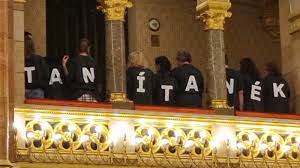The goal is for all current elementary school students to at least have a profession later on and to be able to thrive in life according to their abilities, stated the State Secretary responsible for economic strategy and regulation of the Ministry of Innovation and Technology in Szeged on Thursday.
László György of Let's Teach for Hungary! program at the University of Szeged (SZTE), he said that in Hungary - as everywhere in the world - there are small towns far from work and further education opportunities, from which children cannot enter the field for which they would be suitable based on their abilities. Of the children living in these small settlements - although 98 percent continue their education - 54 percent only obtain a primary education, compared to the national average of 12 percent.
He explained that the main problem is that these children do not leave the border of their settlement until they are 14 years old. The subsequent change of school and community is thus experienced as an ordeal.
Let's Teach for Hungary!
program provides these students with defining experiences. And to the mentors who deal with them and are close to them in age, they dare to ask questions that others cannot. MTI/Sándor Ujvári
Addressing the mentor students who participated in the open day, he emphasized that if they can do good to someone, they do good to the whole society. László György said that the mentor students can learn at least as much from this work as the students they help. They will be able to use the experience gained in this way in their later work.
Judit Fendler emphasized that the goal of z SZTE is to ensure that nothing can prevent young people in the region who wish to participate in higher education. Let's Teach Hungary is a serious tool for this! program.
Edit Újvári , director of the SZTE Junior Academy, announced that nine instructors from the five faculties of the university were involved in the training of the mentor students. Currently, one hundred student mentors from the higher education institution work with young students in 21 elementary schools in the Southern Great Plain region, and in the spring semester, another hundred university students will join this work.
Source: Origo
(Cover photo: MTI/Sándor Ujvári)











